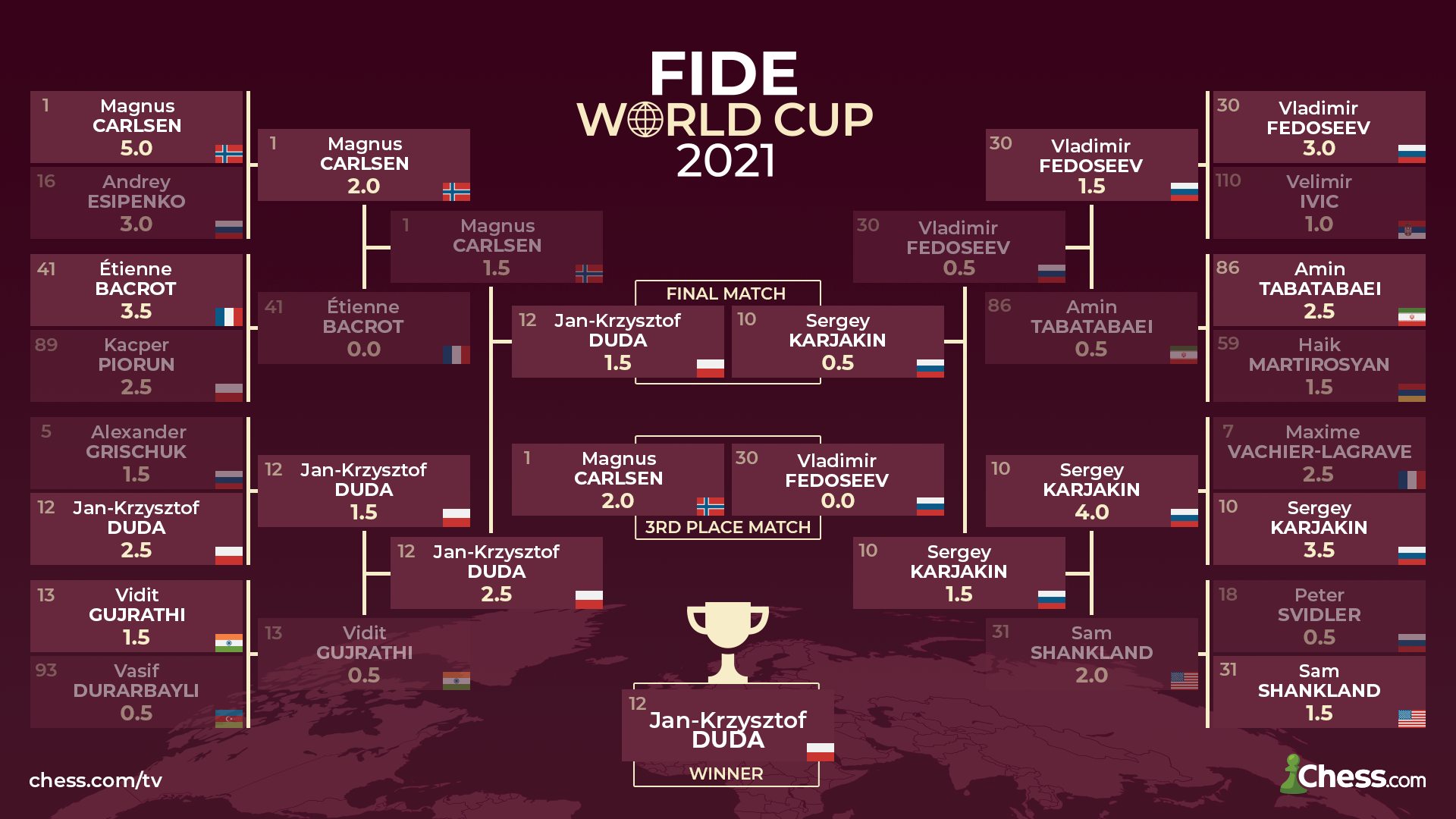The biannual FIDE World Cup ended last week in Sochi, Russia. For the first time, there was a concurrent Women’s World Cup as well, which ended a couple of days before that.
How Does It Work?
 Imagine an elimination bracket of 256 players, sorted strictly by rating from highest to lowest.
Imagine an elimination bracket of 256 players, sorted strictly by rating from highest to lowest.
They are paired 1 vs. 256, 2 vs. 255, 3 vs. 254, etc. Each pairing plays a two-game match, one contest each on consecutive days, and the loser is eliminated. The third day is a rest day for players who won their matches 2-0 or 1½-½, or tiebreaks (rapid, and if necessary blitz or armageddon) for pairings that ended 1-1.
After the first round, 128 players are left, then 64, 32, 16, 8, 4, and 2 in the final.
The Open World Cup had 206 players instead of 256, where the top 50 players by rating didn’t have an opponent, and got a bye into Round 2.
Similarly, the Women’s World Cup had 103 players: a bracket of 128 players where the top 25 by rating got a free pass into Round 2.
In case you’re wondering, males and females can qualify for and play in the World Cup, while only female players can participate in the Women’s World Cup. This is analogous to other major events that have an Open and Women’s section; e.g.: the Chess Olympiad, the World Championship cycle, and most if not all National Championships.
World Cup in The Pandemic Age
A few players needed to withdraw during the event because of a positive COVID test, and others did so out of caution, including Levon Aronian (Armenia).
As I posted in March 2020, FIDE’s decision to proceed with the Candidates Tournament was risky but in my opinion defensible. Once again, FIDE took serious chances in holding the World Cups, with hundreds of players and officials from around the world converging in one place.
The verdict? In the grand scheme of things, FIDE came out smelling like a rose!
Winners of the FWC and FWWC
 Jan-Krzysztof Duda and the World Cup trophy. Not shown: his 110,000 euro prize! Photo: FIDE
Jan-Krzysztof Duda and the World Cup trophy. Not shown: his 110,000 euro prize! Photo: FIDE
Jan-Krzysztof Duda (Poland) won the Open event, defeating Sergey Karjakin (Russia) in the final. Both qualified for the 2022 Candidates Tournament.
JKD, now just outside the Top 10, knocked out World Champion Magnus Carlsen (Norway) in the semi-final, while Karjakin eliminated Vladimir Fedoseev (Russia) in this round as well.
Carlsen beat Fedoseev in the third-place match, held concurrently with the final.
Having recently become the first female to ever qualify for a Russian Superfinal, I didn’t think anyone would stop Aleksandra Goryachkina (Russia), top seed in the Women’s World Cup. Honestly, I had more confidence in her than I did Carlsen in the Open event!
 Alexandra Kosteniuk has reached yet another peak in a long, successful career. Photo: FIDE
Alexandra Kosteniuk has reached yet another peak in a long, successful career. Photo: FIDE
Indeed, Goryachkina mowed down the field … until the final, where she was vanquished by former Women’s World Champion Alexandra Kosteniuk (Russia)!
The “Chess Queen” played out of her mind. After a first-round bye as the 14th seed, Kosteniuk won ALL of her matches in regulation, not needing any tiebreaks, and collected 43 Elo points!
Tan Zhongyi (China) won the third-place match over Anna Muzychuk (Ukraine). Since Goryachkina is already qualified for the next Women’s Candidates Tournament by virtue of playing the last Women’s World Championship Match, I believe Tan joins Kosteniuk in the next Women’s Candidates.
Why I Love the World Cup
So much drama! Two-game mini-matches guarantee excitement and frayed nerves.
Even if the players decide to make two short draws in regulation, the presence of tiebreaks ultimately don’t give them an easy way out.
We typically see the same players doing well in knockouts over the years (remember, they go back to 1997 if we include the FIDE World Champioships held in a similar format). In years past, Mickey Adams, Vishy Anand, Ruslan Ponomariov, Gata Kamsky, and Levon Aronian always seemed to reach the final stages of these events.
I don’t believe that’s a coincidence — great nerves and ability to handle pressure really show in the World Cup. Fun fact: from 2001-02 through 2011, Ponomariov either won the Knockout (2001-02), or lost to the eventual winner!
In recent times, Karjakin has taken on the mantle of “KO King.” He staged an epic comeback in the final against Peter Svidler in the 2015 edition.
On the Women’s side, this is Kosteniuk’s second victory (2008) and third finals appearance (she lost to Zhu Chen way back in 2001!). Those events were Women’s World Championships.
What do you think of the World Cup? Leave a comment!
